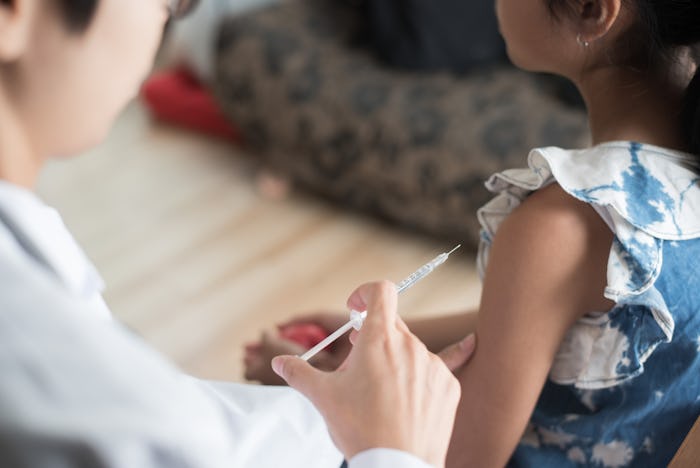In 2006, the FDA approved the use of Gardasil, the first vaccination to protect against certain cancers caused by the human papillomavirus, better known as HPV. And yet despite being in use for 13 years, even parents who don't hesitate to vaccinate are asking themselves, "Should my child get the HPV vaccine?" While it's understandable to be wary of any vaccine's safety, necessity, and efficacy, it's also important to separate fact from fiction so you can best protect your child.
Romper spoke with Professor Bridget Welker, Assistant Professor in the online nursing program at Bradley University, to better understand just how vital the HPV vaccine is. And, according to Welker, the Centers for Disease Control and Prevention (CDC), the World Health Organization (WHO), the American Academy of Pediatrics (AAP), the Advisory Committee on Immunization Practices (ACIP), and the American College of Obstetricians and Gynecologists (ACOG), the answer is yes: your child should have the HPV vaccine.
"The human papillomavirus (HPV) is the most common sexually transmitted infection in The United States," Welker explains. "It is a virus that affects both men and women equally." A reported 80% of the population will contract HPV, according to the CDC, and there are approximately 14 million new cases a year. And while most infections will go away on their own, those that do not may eventually lead to various cancers, including cancers of the cervix, vagina, vulva, penis, anus, and the back of the throat. To protect against these cancers, the CDC recommends HPV vaccination at ages 11 to 12, ideally before children are exposed to HPV in the first place.
"[Vaccinating against HPV] involves two injections if received before the age of 15 and three after," Welker says. "Research demonstrates that even one injection is better than none." Recently, the vaccine has been approved for administration to patients up to age 45 by the Food and Drug Administration, as reported by the Washington Post.
Despite frequent news stories about the rise of so-called "anti-vaxxers," the truth is that very few parents opt out of vaccines completely. For example, according to CDC data, approximately 91.9% of children ages 19 to 35 months are vaccinated against Polio. Rates for other recommended vaccines, such as those for Measles, Mumps, Rubella (MMR), chicken pox, and Hepatitis B, are similarly high. And yet, as of 2017, the latest year for which we have CDC data, only about 66% of male and female adolescents age 13 to 17 received the first dose of the HPV vaccine. Even more troubling, less than half (49%) were up to date on their HPV vaccinations.
Thankfully, the same CDC data shows that the HPV vaccination rate has been increasing by about 5% each year since 2013. Yet hesitation about the vaccine remains a public health issue. Why?
Anne Rositch, an assistant professor in the Department of Epidemiology at Johns Hopkins Bloomberg School of Public Health, and Anna Beavis, an assistant professor in the Department of Gynecology and Obstetrics at the School of Medicine at Johns Hopkins Medical, examined the issue in a 2018 study published in the Journal of Adolescent Health. "Common reasons that parents reported they didn't want to vaccinate their children included... perceived lack of safety, perceived lack of necessity, and then also a lack of knowledge about the vaccine," Beavis stated in an interview from Johns Hopkins.
The HPV vaccine is safe, effective, and, in the years to come, can save thousands of lives.
Researchers also found that one in 10 parents reported that practitioners did not recommend vaccination for girls, and one in five did not recommend vaccination for boys. This mirrors what Welker has found in her own research.
"Two of the most common reasons that individuals do not receive the vaccine have to do with: the lack of recommendation by the provider and lack of education about the vaccine. [Some] providers do not fully understand the benefits of the vaccine," Welker says. She has also found that many parents fear the vaccine is linked to sexual activity and the perception of dangerous side effects.
As with any vaccine, the HPV vaccine does have proven side effects, per the CDC, but are generally mild and go away on their own. These include pain, redness, or swelling in the arm where the shot was given, fever, headache or feeling tired, nausea, and muscle or joint pain. Many patients will not experience any of these symptoms. Aside from the rare, severe allergic reaction, the most serious potential side effect of the vaccine is fainting. While the vaccine is not recommended for those with a life-threatening allergy to any of the HPV vaccine components, pregnant or nursing parents, or those who are temporarily ill on the day of a scheduled vaccination, continued, international safety studies have ensured that, for the general population, this vaccine is extremely low risk.
"The vaccine is approved by the FDA and constantly monitored by the CDC," Welker says. "It is safe."
Every year, the CDC reports almost 35,000 cases of cancer caused by HPV in men and women, including 90% of anal and cervical cancers, 70% of vaginal and vulvar cancers, and more than 60% of penile cancers. Fortunately, the HPV vaccination can prevent 32,000 of these diagnoses: a staggering 92% of such cases. According to data from the National Cancer Institute, that would account for 6,236 now preventable deaths per year. Indeed, places with high vaccination rates, such as Scotland, have seen dramatic decreases in cervical precancerous cells in young women over the past decade, according to reporting from the BBC.
The HPV vaccine is safe, effective, and, in the years to come, can save thousands of lives. "It would be negligent to not provide this opportunity to eligible patients," Welker says.
